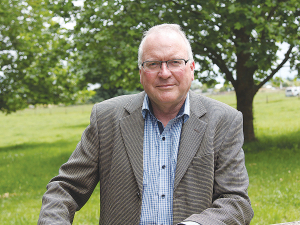M.I.A.
OPINION: The previous government spent too much during the Covid-19 pandemic, despite warnings from officials, according to a briefing released by the Treasury.
 Ruakura Technologies chief executive officer Dr Steve Hodgkinson claims the product is positioned to meet a market need for science-backed immune support.
Ruakura Technologies chief executive officer Dr Steve Hodgkinson claims the product is positioned to meet a market need for science-backed immune support.
Hamilton-based Ruakura Technologies is developing a dairy-based natural product that it says has the potential to offer immediate short-term immune support against the virus causing Covid-19 disease.
The eventual product is intended to safeguard people in high-risk situations including events, frontline work, or during mass transportation such as on trains or flights.
Still in the early stages of development, a technical breakthrough captured as a provisional patent filing, means the product is getting ready for on-farm pilot-scale production of the immune milk-based active ingredient using selected animals.
Chief executive officer Dr Steve Hodgkinson says the product is positioned to meet a market need for science-backed immune support, particularlyy relevant considering the current pandemic.
"Beyong vaccines, PPE and social distancing, there are few options available for people wanting to reduce their personal risk of contracting Covid-19. We are working towards a product that can provide science-backed immune support," says Hodgkinson.
The science mimics nature in much the same way that a mother's milk protects the newborn.
The recent breakthrough, made in collaboration the University of Waikato, has centred around the design of coronavirus antigens that induce antibodies in ruminant milk that block virus binding to the receptor that allows entry to human cells.
The product is intended for immediate, short-term protection, so users would take a productive dose when entering a high-risk situation and receive protection for 3-4 hours. The product is different to a vaccine, which is slower to act, but provides longer term protection.
Hodgkinson says the freedom that the product could provide consumers is exciting, especially with so many Kiwis currently facing alert level restrictions. With the proof-of-concept phase complete, the time to market for the final product, which will likely be taken as an oral supplement or nasal spray, should be relatively short.
Hodgkinson says the potential application of the technology extend well beyond the current pandemic, with opportunities to provide immune support against other pathogens, such as norovirus, which regularly sweeps through close-quartered environments like cruise ships and retirement villages.
Notably, the research has been self-funded to date via a loan from Callaghan Innovation. Hodgkinson says, "we are looking for funders and partners who can help us move into pilot-scale production and launch a product next year".
The Meat Industry Association of New Zealand (MIA) today announced that Chief Executive Officer Sirma Karapeeva has resigned from the role.
The winners of the 2026 Hawke’s Bay/Wairarapa Dairy Industry Awards were announced at the annual awards dinner held at Copthorne Solway Park in Masterton on Thursday evening.
Environment Southland is welcoming this week’s decision by the Environmental Protection Authority (EPA) to approve the release of Blaptea elguetai, a leaf‑feeding beetle that will help control the highly invasive Chilean flame creeper.
This March, the potato industry is proudly celebrating International Women’s Day on 8 March alongside the International Year of the Woman Farmer, recognising the vital role women play across every part of the sector — from paddocks and packhouses to research, leadership, and innovation.
Fruit trader Seeka posted a record profit and returns to shareholders in 2025.
Recent weather events in the Bay of Plenty, Gisborne/Tairawhiti, and Canterbury have been declared a medium-scale adverse event.
OPINION: Staying with politics, with less than nine months to go before the general elections, there’s confusion in the Labour…
OPINION: Winston Peters' tirade against the free trade deal stitched with India may not be all political posturing by the…